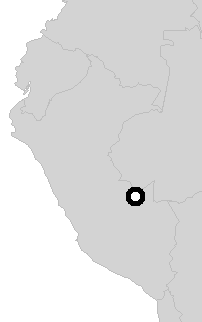
| www.CuriousTaxonomy.net |
|
The Flood in World Myth and Folklore
Andes |
| © 2021 Mark Isaak |

The world wanted to come to an end. A llama buck, knowing that the ocean would soon overflow, was depressed. When its human owner complained that it wouldn't eat, the llama told him that the flood would occur in five days and suggested they go to Villca Coto mountain with five days' food. The man left in a hurry, carrying both the llama and the supplies. They arrived at the mountain to find the peak already filled with all kinds of animals. The flood came as soon as they arrived and lasted five days, then it dried to the ocean's normal position. The fox's tail was soaked, which turned it black. Afterwards, the man began to multiply once more.
Salomon, Frank & George Urioste, The Huarochiri Manuscript (Austin: University of Texas Press, 1991), 51-52.

Paria Caca, a god born from five falcon eggs, heard about a man called Tamta Namca who called himself a god and had himself worshipped, and about other people's sins. He went into a rage, rose up as rain, and washed them all away to the ocean, together with their homes and llamas. At that time a tree called the Pullao formed an arch between the Llantapa and Vichoca mountains; in it lived monkeys, toucans, and other birds. These too were swept to sea.
Salomon, Frank & George Urioste, The Huarochiri Manuscript (Austin: University of Texas Press, 1991), 59-60.

Paria Caca went to the village Huauqui Usa, which was celebrating a festival. He sat at the end of the banquet like a stranger. No one offered him a drink while he sat there, until at the end of the day a woman finally did so. Paria Caca told the woman that these people had made him mad, told her that in five days something terrible would happen to the village, and warned her to take her family away and not to tell anyone else, or he might kill her, too. Five days later, the woman and her family left. The other villagers continued drinking without a care. Paria Caca climbed Matao Coto, a mountain which overlooks the village, and rising up as red and yellow hail, caused a torrential rainstorm. It washed all the villagers to the ocean and shaped the slopes and valleys of the area.
Salomon, Frank & George Urioste, The Huarochiri Manuscript (Austin: University of Texas Press, 1991), 61-62; see also p. 127.

In antediluvian times, the god Pariacaca, in the guise of a stranger, went to the village of Waykuila looking for his enemy Karwincho. The people in Waykiula were engaged in a holiday celebration and did not notice Pariacaca. Only one humble woman named Toykoña felt sorry for him and offered him a glass of chicha.
The grateful Pariacaca said to her, "In five days, you will see the fortune of these people. Move away before then, for I will punish them, but say nothing to anybody."
Pariacaca left and went to the hill Catachucoto, and from there called for a torrential rain which completely devastated the people, dragging them down to the sea.
When she had climbed to the summit of Koriwanka, Toykoña heard the noise of the rain and the flood and turned back to look at her city for the last time. At that moment she turned into a stone or wanka, which cries even to today, crystalline tears come from her eyes and serve to irrigate the crops of upper Waykiula.
Alejandro Ortiz Rescaniere, Huarochiri, 400 Años Despues (Peru: Pontifica Universidad Católica del Perú, 1980), 37-38.

The Inca summoned people from every village to help defeat their enemies. Paria Caca sent his child Maca Uisa. When nobody else at the meeting offered to help, Maca Uisa said he would defeat the enemies completely. Strong litter bearers carried him to the battle front, and as soon as he got there, he started raining on them, gently at first, then pouring rain. He washed away their villages in a mudslide and killed their strong men with lightning bolts. Only a few common people were spared.
Salomon, Frank & George Urioste, The Huarochiri Manuscript (Austin: University of Texas Press, 1991), 115.
